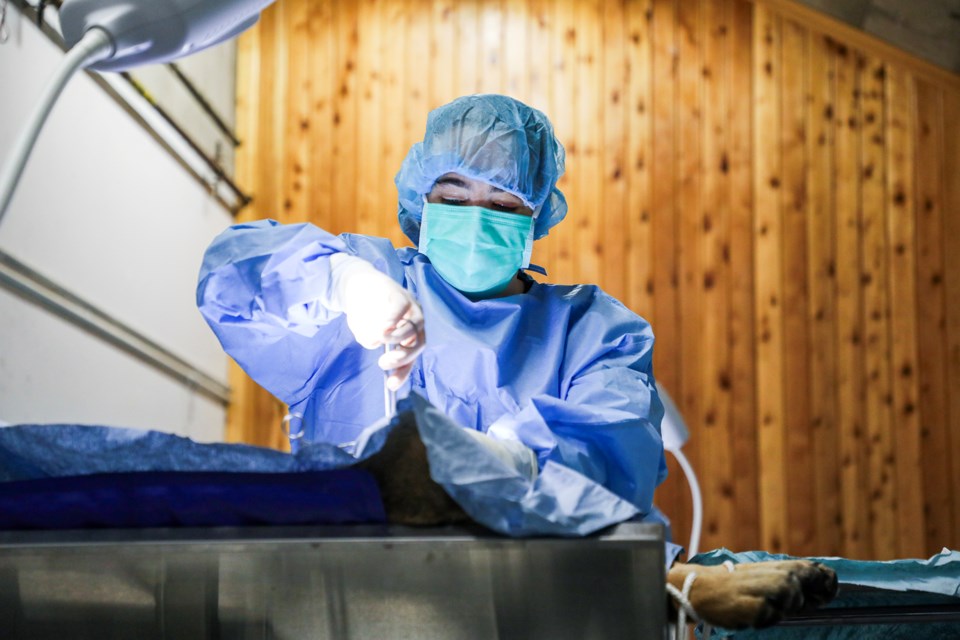ÎYÂRHE NAKODA – About 72 dogs and cats will be altered free of charge over six days at the Chief Goodstoney Rodeo Centre in Mîni Thnî from March 26-28 and April 2-4, and hundreds more will receive health examinations.
The initiative is part of a vet clinic blitz put on by the University of Calgary’s faculty of veterinary medicine, in collaboration with the Îyârhe (Stoney) Nakoda First Nation community.
“There was a community member from Stoney Nakoda who used to come and talk to some of our vet students who would go to the Northwest Territories every year to provide preventative vet services to five Indigenous communities that otherwise don’t have access,” said Tessa Baker, postdoctoral scholar with the university’s faculty of veterinary medicine.
“He would talk about First Nations relationships with animals and perspectives on dogs, and while he was speaking from a Stoney Nakoda perspective, it sort of got our students thinking about different relationships with animals and dogs that they might encounter when they were up north.
“He would always jokingly say ‘you guys don’t have to travel so far to be able to work with a community around access to veterinary care and potentially addressing community concerns around dogs and things like that.’”
That was in 2017, and the U of C has since been working with the community, meeting with elders, going into local schools to offer hands-on learning activities to students and offering barrier-free vet clinics to community members and their animals.
“Those initial meetings with elders and knowledge keepers, helped us sort of start these discussions around, if our faculty was going to partner with the community, what would be some of the community’s priorities, what would they want that partnership to look like and where can we work together?” said Baker. “That was really helpful for us to be able to start developing an animal health program that was driven from community priorities because we obviously come in with ideas, but that might not fit with what the community was looking for.”
This is the third set of clinics the university has held in Mînî Thnî, which will total over 500 dogs and cats examined and/or vaccinated, and around 263 spayed or neutered since March 2023.
The clinics are made possible by a grant from PetSmart Charities and ongoing relationship-building with the Nation to determine the needs and wants of the community when it comes to vet care. The rodeo centre is offered up to the U of C for free by Goodstoney First Nation and Stoney Tribal Administration staff assist with booking appointments.
“The grant was sort of to take this program that was basically the youth outreach piece that we had been doing for a few years by then and expand it into a program that would span all four years of the university’s veterinary program,” said Baker.
In the first year, she said vet students watch the Nakoda AV-produced documentary Ahomapénî: Relations and Rez Dogs, which explores the relationships Îyârhe Nakoda people have with their animals.
“They watch that in one of their classes and then they have a discussion with the folks who made the film and often an elder will come, as well. And again, it just gets them thinking about how perception can really impact people,” said Baker. “Like how do outsiders view these dogs and how do people living on the reserve view these dogs and how do those differ based on their lived experiences and biases?”
Jolie Crawler, who is part of Îyârhe Nakoda First Nation and helped community members book appointments for the vet clinic, said there is a perception from those not living in the community that some don’t care for their dogs if they’re found roaming freely.
But this couldn’t be further from the truth, she said, and it ignores the historical relationship the First Nation has with the animal, which was often used in hunting or as a pack animal.
She said sheer demand for appointments the U of C offers also argues against any narrative that community members don’t care for their animals.
“The demand has been high all three occasions that they’ve been out,” said Crawler. “The fact is, there are often barriers people face, too, where some community members just don’t have the kind of money to access these kinds of services. Some do, but not everybody.”
She noted organizations like the Cochrane Humane Society also offer spay/neuter services to Nation members at a reduced fee, but there is often a long waitlist.
Baker said there are several volunteers who also assist with the clinics and multiple corporate sponsors that donate supplies like vaccines, deworming products and suture materials.
Because transportation can also be a barrier, the clinic offers home visits while vets are in the community.
“It’s just kind of trying to find that balance of how do we provide accessible care,” said Baker.
The clinics have been held about once every six months and Baker said the PetSmart grant runs up in August, at which point the U of C will be looking at other ways to partner with organizations and the community – if there is a desire to continue – to discuss how preventative health services could continue to be offered.
The Local Journalism Initiative is funded by the Government of Canada. The position covers Îyârhe (Stoney) Nakoda First Nation and Kananaskis Country.




